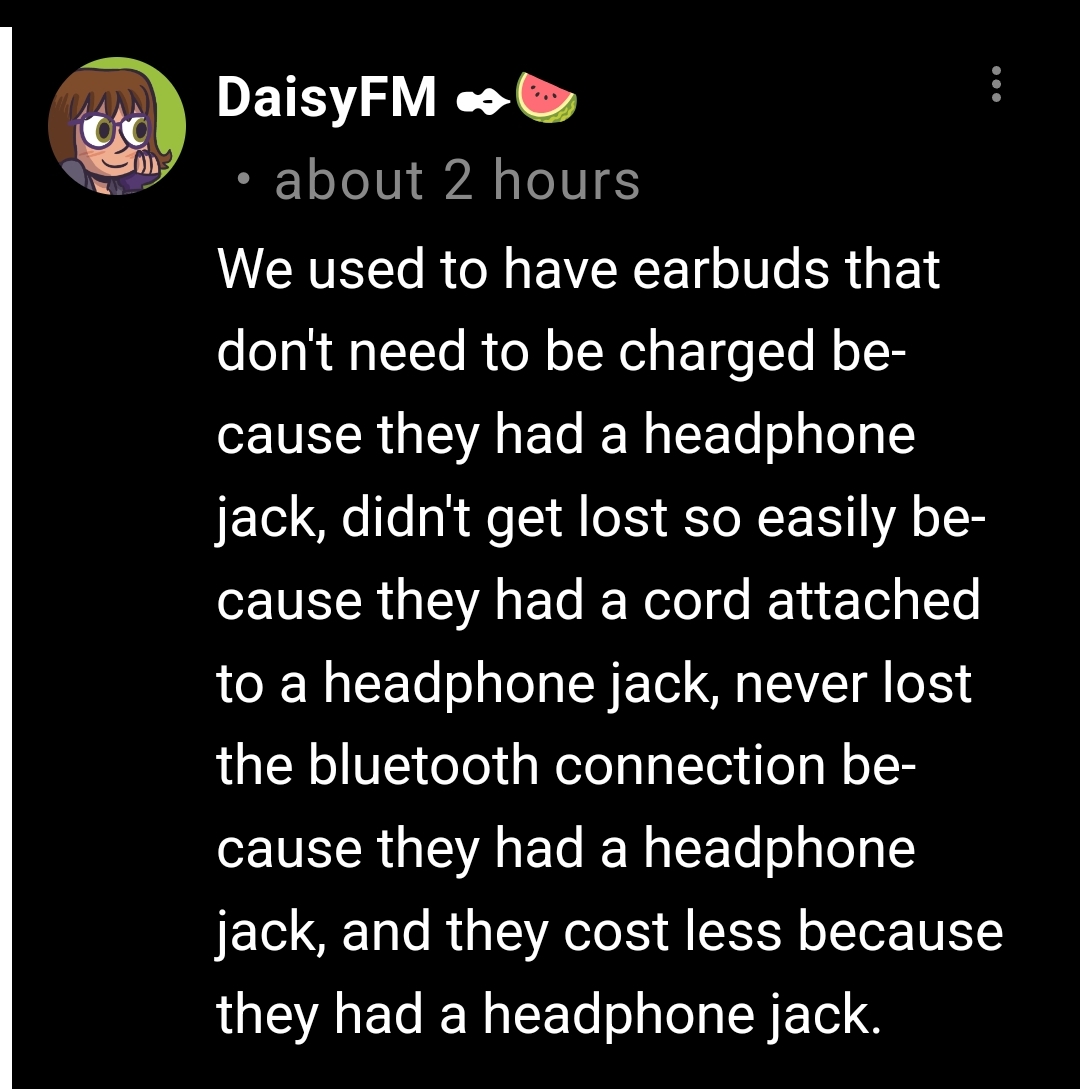this post was submitted on 08 Sep 2024
1651 points (95.4% liked)
Microblog Memes
8278 readers
2296 users here now
A place to share screenshots of Microblog posts, whether from Mastodon, tumblr, ~~Twitter~~ X, KBin, Threads or elsewhere.
Created as an evolution of White People Twitter and other tweet-capture subreddits.
Rules:
- Please put at least one word relevant to the post in the post title.
- Be nice.
- No advertising, brand promotion or guerilla marketing.
- Posters are encouraged to link to the toot or tweet etc in the description of posts.
Related communities:
founded 2 years ago
MODERATORS
you are viewing a single comment's thread
view the rest of the comments
view the rest of the comments

4 - Audio quality. Since these are expensive drivers, you’re often going to get better sound quality
Heheheheheheh
No.
Bluetooth bitrate is like 328kbps, which is absolute and total garbage mp3 quality. If you're on Bluetooth, you aren't even getting CD quality. We're going backwards so far.
It’s a bit more complicated than that. There are multiple codecs available (some with much higher bitrates), but even in AAC (which I assume you are referring to) there are different implementations. Also note that 328kbps is not “garbage mp3”, 128kbps CBR was the common (and shit) variant that you probably meant. But more modern codecs achieve much better fidelity at lower bitrates even.
328kbps is absolutely horrid and nowhere close to CD quality (1411 kbps). Good quality audio is over 6000 kbps.
328kbps in a lossy format is plenty. You might be one of those people who claim to hear the difference, but to date we are yet to see a double blind trial where a substantial percentage of individuals reliably could demonstrate such ability.
328 kbps is nowhere near enough. 1411 kbps .wav is the minimum I'll listen to, even on my phone.
24 bit 96kHz is optimal, but I can't hear any difference going higher than that.
As someone who uses FLAC for all of my audio needs, yeah I agree that Bluetooth bitrate is pretty bad (and often uses the lower quality.)
But this image is basically claiming that "cheap passive" plug-ins are superior to the more expensive bluetooth ones. That's simply not true. My experience with those have basically always been bad, so I'm not a big fan of ear buds to begin with over headphones. I don't take the person in the image that OP posted is all that worried about lossless (or even high quality lossy) and is more concerned with money to value. So while the analogue audio out can be high quality, you're simply not benefitting from it if you buy any sub $100 earbuds where the EQ profiles are all trash. And if you're going to spend over $100, at that point you may as well go for the bluetooth connected for all of the other pros mentioned.
I am a firm believer that super-high-quality seekers already know what they want: Over the ear cans that deliver awesome sound and have noise cancelling by their sealed design. They were never the people buying throw away headphones anyway. That's basically why I said that they're great but certainly not for anyone who wants to do professional audio (unless for sound testing what normal humans are likely to hear, ofc.)
edit: Oh and, just to be clear, I think every phone should have a headphone jack as well because the option for analogue is important! I wouldn't say I'm 100% thrilled with less options, mind you.